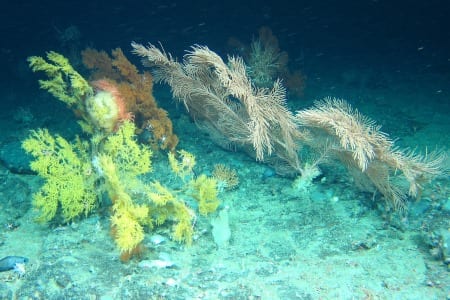Marine scientists discovered rare sponge reefs and a possible new type of coral on an expedition off the west coast of Ireland earlier this summer.
The team returned to Galway at the end of July after spending three weeks on the ILV Granuaile investigating Ireland’s deep ocean territory 300 miles off the coast.
They used a Marine Institute remotely operated vehicle (ROV) – called Holland 1 – to capture high definition video of the deep sea.
While at sea the scientists found a number of ‘firsts’ in Irish waters, including a species of octocoral that grows into huge fans with a delicate porcelain-like skeleton.
Another new discovery was a species of black coral different to others described to date, which may prove to be an entirely new species.
Irish waters are thought to be a haven for these delicate deep-sea black corals.
The team of scientists also reported areas of potential ‘sponge reef’ on the Rockall Bank.
Sponge reef is a highly unusual accumulation of living and dead sponges forming a complex habitat for many other creatures.
Such formations are very rare and have previously only been recorded in Canadian waters.
The scientists included researchers from the Marine Institute, NUI Galway, the National Parks and Wildlife Service, and Plymouth University.
Chief Scientist on the expedition David O’Sullivan from the Marine Institute said: “We are very pleased to discover what appear to be new coral species and a rare sponge reef, neither of which have been previously documented in Irish waters.
“These sensitive habitats are very important and this study is key to getting a better understanding of Ireland’s deep sea. Our key objective is to discover, protect and monitor Ireland’s rich offshore marine biodiversity so we can manage our marine resources effectively. Without a knowledge of what lives on our seabed we are at risk of never fully understanding and appreciating Ireland’s invaluable marine environment.”
Plymouth University’s Dr Kerry Howell added: “This is the first time I have seen a sponge reef like this in nearly 20 years of studying the deep NE Atlantic. This is an important find.
“Sponges play a key role in the marine ecosystem providing habitat for other species and recycling nutrients. They may even be a source of new antibiotics. These new data will help us to better understand where and why these reefs occur.”
Cold water coral reefs are ecosystems that host a diverse range of marine animals including sea fans, sponges, worms, starfish, crustaceans and a variety of fish species.
These fragile deepwater reefs are vitally important habitats for marine biodiversity.
The last two decades have seen a dramatic increase in our understanding of the cold water coral reef ecosystems, their susceptibility to environmental change, and their low resilience to human impact.
The ‘SeaRover’ survey is the second of three planned expeditions jointly funded by the Irish Government and the EU’s European Maritime and Fisheries Fund.











